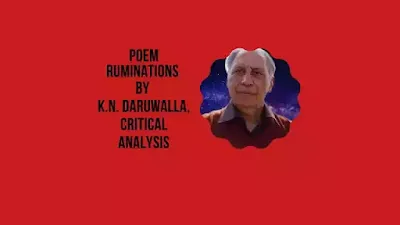“Ruminations” is a study of communal tension resulting in violence and suffering. The poet has an apprehension of the outbreak of violence, caused by mutual hatred and wants of tolerance and understanding between two groups communities, in near future:
“I can smell violences, in the air
like the lash of coming rain
mass hatreds drifting grey across the moon.”

The outbreak of violence would result in the death of countless of innocent persons, destruction of property, sufferings of the poor, chaos and disorder. Daruwalla expresses through highly evocative, suggestive and picturesque images and similes the trail of hatred, insensitivity, sharpening misunderstanding and suspicion left behind by large scale violence and vandalism:
“It havers brooding poised like a cobra
As I go prodding rate holes
And sounding caverns
looking for a fang that darts,
A hood that sways
And eyes that squirt a reptile hate.”
The images of cobra, rate holes, fang hood and reptile hate are suggestive of the vicious and poisonous nature of violence and hatred, utter contamination and pollution of human thought.
The poet goes about looking for the places where this violence might break out and where death might raise its ugly head:
“Cross - bones I look for you!
Death I am looking
for that hald bone - head of yours.”
Daruwalla, then, realistically describes the mostnary where the dead bodies of persons killed in violence would be taken and kept for post - mortem and for identification by the near and dear ones of the deceased. Dead bodies begin to decompose and degenerate, and consequently foul and nauseating stench emanating from them cannot be drowned by any aromatic substance and burning of incense. There, in the dead body of a woman in the morgue - verandah, whose nose was sliced off and whose breast was stabbed in leaving her lungs punctured by her husband on a suspicion of infidelity.
Man is adamant and unbending when he is alive. He is uncompromising and incapable of tolerance and cultivating mutual trust and understanding. But after death he becomes pliant and adjusts to whatever condition he is put to. Here is irony. Had he been pliant, tolerant and accommodating the widespread killings and destruction could have been avoided. Man is pliant only in the lap of death:
“Man is so pliant, adaptable. Bury him
and he is steadfast as the earth
Burn him and he will ride the flames
Throw him to the birds and he will
Surrender flesh like an ascetic.”
Rain, falling torrentially transforms and refreshes everything. Trees, plants and hedges assume bright colours and simile because the coat of dust blurring their real beauty and radiance has been washed away. The poet too years for “a cleasened feeling / the kind you experience / walking in a temple / after a river hath.” Unfortunately the poet cannot experience such refreshing and rejuvenating feeling now. He enjoyed it in the past but now it would never came to him again:
“I cannot find it
I have misplaced it somewhere
in the coverns of my past.”
